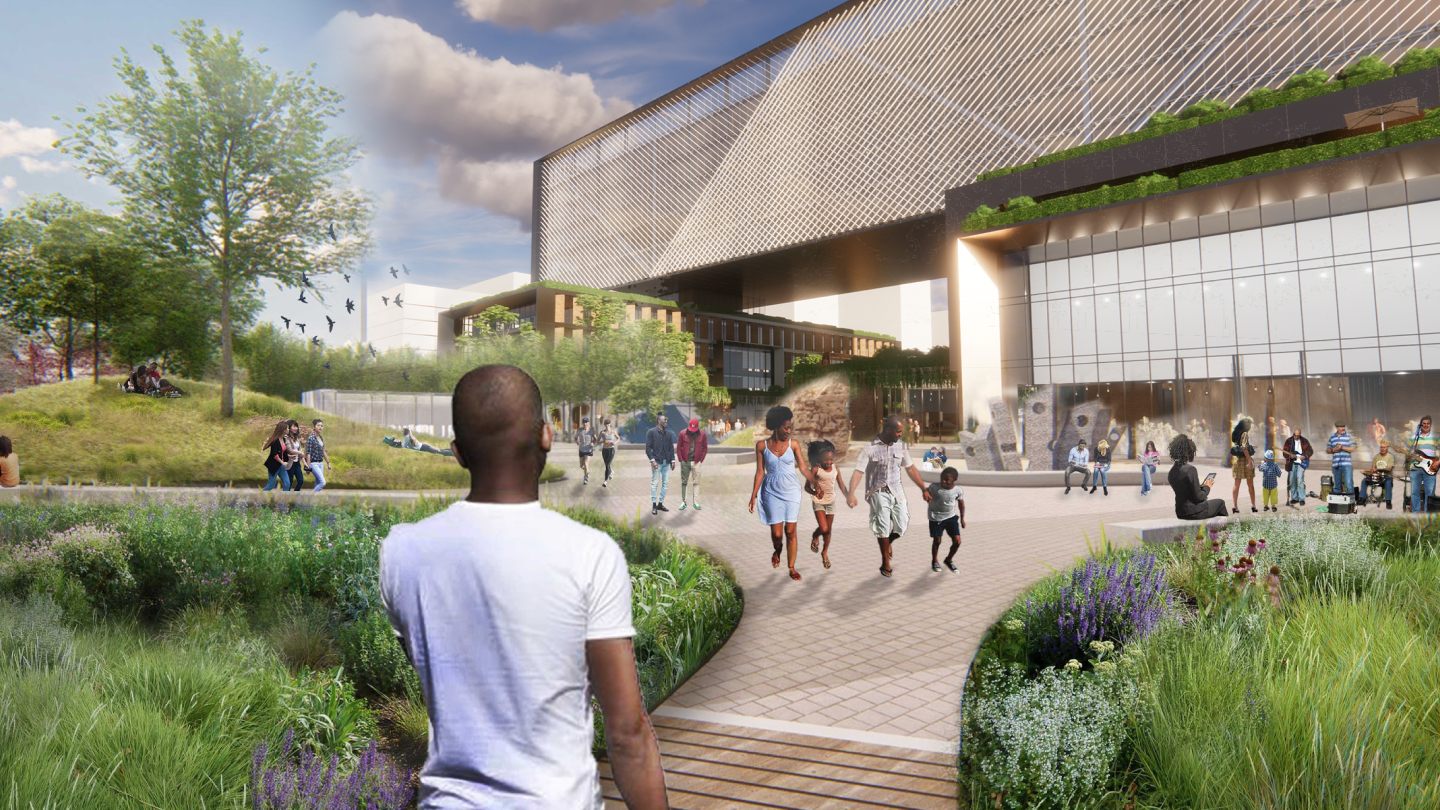
Medical research facility planned for Bronzeville as part of $6 billion ‘healthy neighborhood of the future’
By RYAN ORI
CHICAGO TRIBUNE |
MAR 12, 2020 AT 5:00 AM
The ARC Innovation Center plans to use at least 20% of the space in this building, near 31st Street and Cottage Grove Avenue. It is part of a $6 million to $7 billion planned redevelopment of the former Michael Reese Hospital site and other land south of McCormick Place.
A major Israeli hospital said it plans to open a high-tech medical research facility at the former Michael Reese Hospital site in Bronzeville.
The ARC Innovation Center, led by Israel’s Sheba Medical Center, is envisioned as the first of many life sciences tenants in a multibillion-dollar mixed-use development near McCormick Place. It has agreed to lease 20% to 25% of the space within a 500,000-square-foot building the project’s developers hope to begin constructing next year near 31st Street and Cottage Grove Avenue.
Medical research would be a key aspect of a “healthy neighborhood of the future,” which could grow to 100 acres or more through a series of land acquisitions and could cost $6 billion to $7 billion to develop over the course of about 15 years, said Scott Goodman, founding principal of Farpoint Development.
Funding for the project still must be secured.
The ARC Innovation Center plans to use at least 20% of the space in this building, near 31st Street and Cottage Grove Avenue. It is part of a $6 million to $7 billion planned redevelopment of the former Michael Reese Hospital site and other land south of McCormick Place. (Skidmore, Owings & Merrill/HANDOUT)
One of the goals is to use medical research and wellness initiatives to address a 30-year life expectancy gap between Chicago’s wealthiest neighborhoods and its poorest areas of the South and West sides, said S. Bob Chib, whose firm Kaleidoscope Health Venture is involved in the megadevelopment.
“We believe neighborhoods should determine where you live but not how long you live,” Chib said.
Chicago-based Farpoint is leading the development. Other companies and organizations involved in the venture include the Bronzeville Community Development Partnership, Chicago Neighborhood Initiatives, Draper & Kramer, Loop Capital and McLaurin Development.
The ARC, or Accelerate Redesign Collaboration, center has signed a memorandum of understanding and still must finalize a lease after the development team completes a redevelopment agreement with the city and purchases land from the city and the Metropolitan Pier and Exposition Authority, which operates the nearby McCormick Place convention center, Goodman said.
Developers hope to own the land and break ground on a 2 million-square-foot initial construction phase in 2021, he said. That phase is expected to include the research building, a data center, senior housing, community space, restaurants and retail near the intersection of 31st Street and Cottage Grove Avenue, at the south end of the site, Goodman said.
Later construction phases could include more medical research facilities, apartments and office space.
The health and wellness concept is the latest of several ideas proposed for the 49-acre Michael Reese site. The former hospital land once was envisioned as the Olympic Village as part of Chicago’s unsuccessful bid for the 2016 Summer Games.
It also had been discussed as a potential site for a Chicago casino, and it was proposed an an option during Amazon’s public search for a second headquarters, or “HQ2.”
Farpoint once called the site the Burnham Lakefront, but now calls it the Bronzeville Lakefront in an effort to make it feel more inclusive for the historically African American neighborhood the development hopes to serve, Goodman said.
“The community of Bronzeville and the 4th Ward welcome the opportunity to be home to a world-class health and wellness innovation hub that will benefit the communities in our own backyards as well as society as a whole,” 4th Ward Alderman Sophia King said in a statement from the developers. “This development will open career paths and bring a significant number of jobs to talented and hardworking residents and small businesses owners in our community.”
The Farpoint venture hopes to secure city, state and federal funds to help offset infrastructure costs that could include roads, a new 31st Street Metra train station and, later, a transit route using autonomous vehicles, Goodman said. The developers seek almost $180 million in public dollars for infrastructure needed for the first construction phase, he said.
The venture is in talks with investors and lenders to finance the first phase, while also seeking out additional tenants, Goodman said.
The planned 15 million-square-foot Bronzeville Lakefront development includes plans for a redeveloped stretch of South Cottage Grove Avenue. (Skidmore, Owings & Merrill/HANDOUT)
The site’s location within an opportunity zone, an area designated for big federal tax breaks for long-term investors in real estate projects or companies formed within their boundaries, is expected to help finance the project.
Sheba’s sprawling campus near Tel Aviv includes an ARC Innovation Center, which will be a model for the one in Chicago, said Dr. Eyal Zimlichman, the deputy director general, chief medical officer and chief innovation officer at Sheba.
The Chicago facility will create a place for the area’s universities, medical centers, north suburban pharmaceutical giants, incubators such as Matter and startups to collaborate, he said.
Sheba is forming strategic initiatives with local companies such as Baxter International and Allscripts Healthcare Solutions, Zimlichman said. Sheba already has similar relationships with companies such as Merck, Boston Scientific and AstraZeneca, he said.
The goal in Chicago is to make advances in artificial intelligence, drugs, medical devices, virtual and 3-D technologies, telemedicine and other types of treatments and technologies, Zimlichman said.
Kaleidoscope will help secure investors for startups and will operate the ARC facility day-to-day, Chib said.
Several other Chicago developers are proposing biotech-related spaces. That includes Goodman’s former firm, Sterling Bay, which envisions the sector playing a big role in its $6 billion Lincoln Yards megadevelopment on Chicago’s North Side.